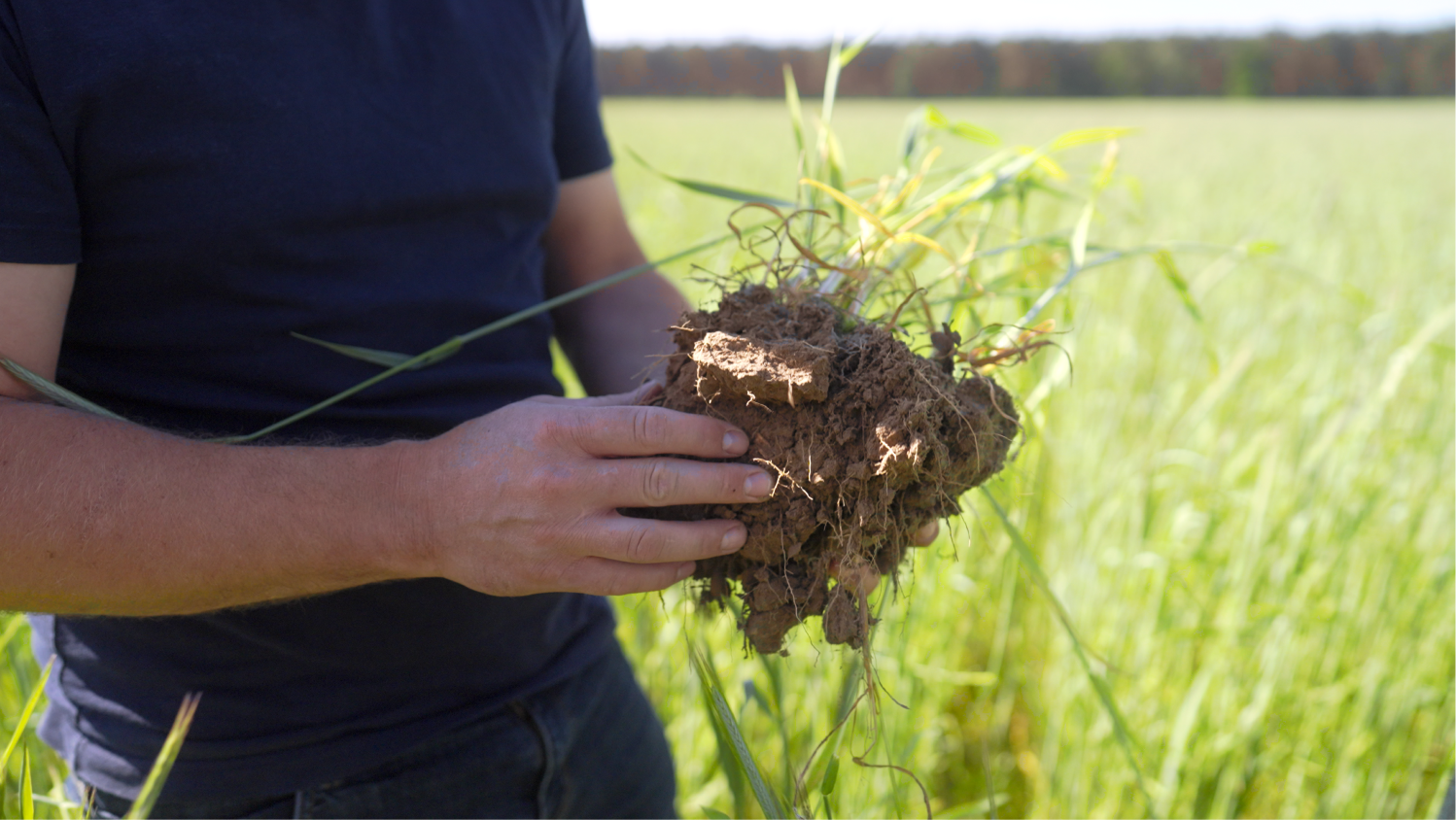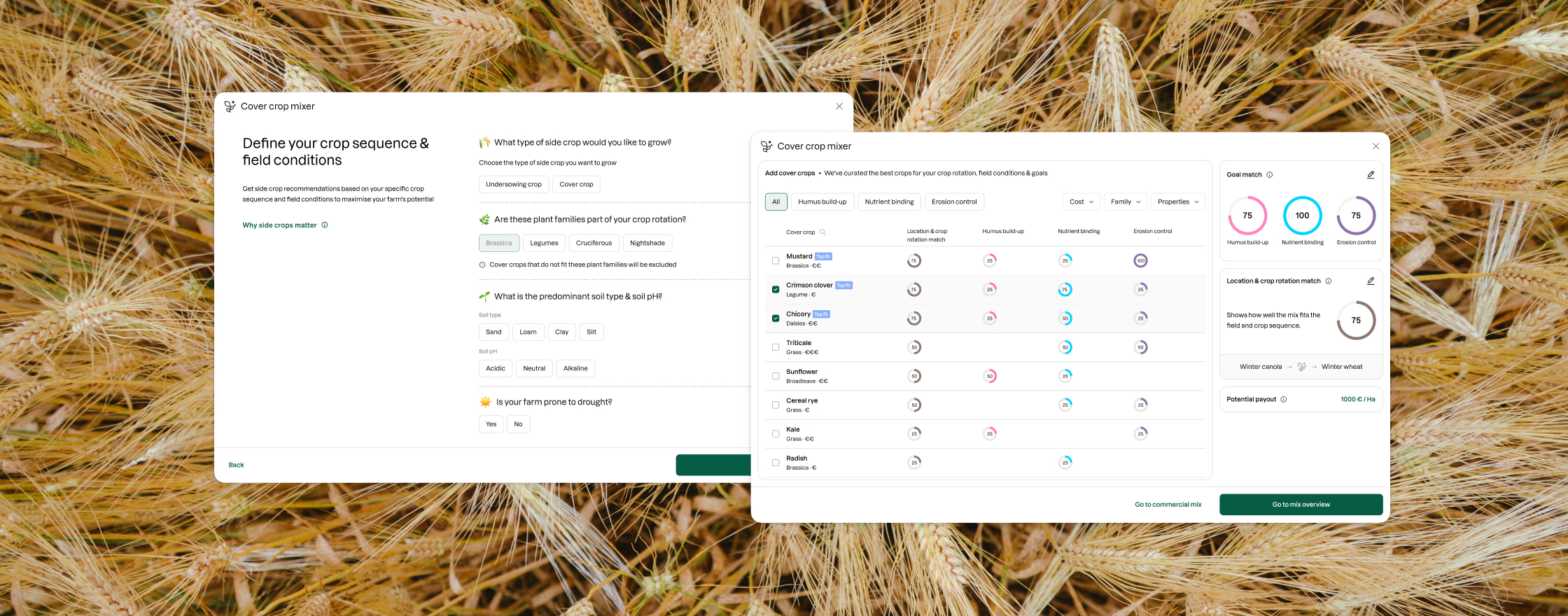
Key messages:
- Regenerative agriculture initiatives build resilient supply chains.
- Food and beverage companies use regenerative agriculture initiatives to increase profitability and strengthen supplier partnerships.
- Early projects show increased yields, lower emissions, and stable sourcing.
As global challenges like climate change and soil degradation threaten the stability of food systems, regenerative agriculture initiatives are emerging as a powerful solution. By restoring soil health, increasing biodiversity, and improving water management, farming practices which follow regenerative principles not only reduce or revers environmental impact but also bolster the resilience of supply chains. Forward-thinking companies across industries are recognising these benefits and integrating regenerative agriculture into their sourcing strategies.
In this post, we highlight six pioneering companies leading the way with innovative regenerative agriculture initiatives, showcasing how regenerative agriculture initiatives and business success go hand in hand.
6 forward thinking companies supporting regenerative agriculture initiatives
More and more companies are integrating regenerative agriculture into their supply chains in order to reduce environmental impact and strengthen long-term supply security.
The following examples show how different industry players are adopting soil-friendly farming methods through pilot projects, partnerships, and land-use or sourcing targets:
- Unilever
- PepsiCo
- Nestlé
- McDonald’s
- HelloFresh
- General Mills
The information presented in this analysis is derived from publicly accessible sources. A full list of references can be found at the end of this page.
Unilever
Unilever incorporates regenerative agriculture into various agricultural supply chains, including soy, palm oil, rice, vegetables, and tea. The aim is to make key raw material sources more resilient to climate risks. By 2030, these practices are to be applied to one million hectares of land. Initial pilot projects across eleven countries already show positive effects on yields, water management, and greenhouse gas emissions.
Supply chain focus:
- Agricultural raw materials such as soy, rapeseed, vegetables, rice, tomatoes, onions, garlic, shea, palm oil, tea, and coffee
- The goal is to make key supply chains more sustainable and climate-resilient
Commitment:
- By 2030, regenerative practices will be applied to one million hectares of farmland
- The Climate & Nature Fund will provide one billion euros for these projects by 2030
- Unilever is also a founding member of the Regenerative Agriculture Fund (RAF) with a target investment of one billion euros
Project locations:
- Eleven countries, including the United States, Brazil, Spain, and Thailand
Impact:
- Projects in Spain and the US show improved water management, reduced GHG emissions, and stable yields
- Rice farmers in Thailand report higher yields with lower costs and reduced fertiliser use
💡A 2023 study by the Food and Agriculture Organization of the United Nations found that approximately 5% of annual global agricultural GDP is lost each year due to disasters.
PepsiCo
PepsiCo integrates regenerative agriculture into its global agricultural supply chains, particularly for potatoes, maize, oats, and sugar. Through its “pep+ Positive Agriculture” strategy, the company plans to apply these practices to around four million hectares by 2030. Pilot projects in North and South America, as well as in Europe, aim to make cultivation methods more climate- and resource-friendly.
Supply chain focus:
- More than 30 crops including potatoes, maize, oats, sugar, oils, and dairy
- The goal is to make these crops more climate-resilient through regenerative measures
Commitment:
- As part of “pep+ Positive Agriculture”, regenerative practices are to be implemented on four million hectares by 2030
- By 2024, 1.4 million hectares had already been reached
Project locations:
- USA and Canada: Partnership with Walmart, ADM, the Soil & Water Outcomes Fund, and Practical Farmers of Iowa
- Latin America: Potato pilot projects in Mexico, Colombia, Chile, and Argentina
- Spain: The “VivaOliva” programme of the PepsiCo Foundation supports 150 olive growers in Jaén
Impact:
- PepsiCo aims to improve irrigation (e.g. through drip irrigation) and create healthier ecosystems in catchment areas
Nestlé Germany
In partnership with Klim, Nestlé Germany focuses on regenerative agriculture in the dairy sector. The goal is to measurably improve the environmental impact across the supply chain, for example through healthier soils, increased biodiversity, and direct climate action on farms. A growing network of agricultural businesses provides the foundation for long-term resilience.
Supply chain focus:
- Nestlé’s net zero roadmap includes a commitment to source 20% of their key ingredients from farmers adopting regenerative agriculture practices by 2025, and 50% by 2030
Commitment:
- Building diverse food production systems to increase efficiency and resilience
- Counteracting the depletion of natural resources
- Improving water availability and quality
- Reducing the impact of climate change
Project locations:
- In collaboration with Klim: 51 farms with a combined total of around 26,000 hectares of farmland in Germany
Impact:
- Annual increase in soil organic matter
- Transformation of farmland into carbon sinks
“Regenerative agriculture is an important pillar in our strategy to reduce emissions. Working with Klim enables us to get farmers and suppliers on board with the transition.”– Philip Werkmann, Sustainability Manager, Nestlé Germany
McDonald’s
McDonald’s is piloting regenerative agriculture projects in sectors such as beef, dairy, and potatoes. The aim is to reduce the environmental impact of its agricultural supply chain through improved grazing systems and soil management. Partnerships with farmers and organisations promote knowledge sharing and the development of joint solutions.
Supply chain focus:
- Key sectors include beef, dairy, and potatoes
Commitment:
- 16 percent reduction in agriculture-related greenhouse gas emissions by 2030, compared to 2018
Project locations:
- UK and Wales: 2023 pilot with 11 beef farms
- UK: Network programme with 54 organic dairy farmers in collaboration with Arla
Impact:
- Regenerative grazing systems aim to enhance carbon capture, soil quality, biodiversity, and water retention
- Collaborations with FAI Farms, Arla, McCain, Syngenta, Promar, NGOs, and financial institutions support joint learning and risk sharing
HelloFresh
HelloFresh is testing regenerative agriculture through a pilot project with an herb supplier in Germany. The goal is to reduce agriculture-related emissions and improve soil quality, water retention, and biodiversity. The project is supported by a carbon insetting fund that helps suppliers transition to soil-friendly methods.
Supply chain focus:
- Decarbonisation of ingredient sourcing, as the majority of emissions stem from agricultural supply chains
- Regenerative agriculture is considered a key strategy, particularly for fresh produce such as herbs
Commitment:
- Establishment of a carbon insetting fund to support suppliers in adopting practices such as crop rotation, reduced tillage, and cover cropping
Project location:
- Ongoing pilot with herb supplier Herrmann Kräuter in Germany, covering approximately five hectares
Impact:
- HelloFresh expects improved soil structure, greater water retention, and more diverse ecosystems
- The company also anticipates increased carbon storage and more stable yields during extreme weather events
General Mills
General Mills is prioritising regenerative agriculture in supply chains for grains and dairy products. The company has set concrete land-use targets and works closely with agricultural partners to implement soil-friendly methods.
Supply chain focus:
- Regenerative practices across grain (wheat, oats, almonds) and dairy supply chains
Commitment:
- One million hectares under regenerative practices by 2030
- Partnerships with the Rodale Institute, American Farmland Trust, Regrow Ag, and ESMC to promote no-till methods, cover crops, and crop rotations
Project locations:
- California (almond project with Sperry Farms) covering around 51 hectares
- Kansas and Saskatchewan (Ahold Delhaize) with approximately 28,300 hectares
- Various key grain-producing regions in the United States
Impact:
- Around 202,300 hectares already enrolled in the programme
- General Mills expects improved soil health and more resilient supply chains
These companies recognise that embracing regenerative agriculture initiatives is not just a competitive advantage, it’s becoming essential for future-proofing supply chains and driving business success. Their commitment sets a clear example that regenerative practices should move from pilot projects to standard operating procedures across industries.
Conclusion
Regenerative agriculture is far more than an environmental strategy, it is a business imperative for resilience and long-term profitability. Companies that adopt these practices today are securing a more reliable supply of raw materials, building stronger partnerships, and creating competitive advantages that protect them against future disruptions and market volatility.
By investing in regenerative agriculture, you not only reduce emissions but also unlock greater efficiency, innovation, and stability across your supply chain. Those who act now position themselves as leaders in sustainability and business success.
Ready to make regenerative agriculture a core part of your strategy? Get in touch with Klim and speak with our experts about your tailored project to reduce Scope 3 emissions.
Sources
- Unilever – How powerful partnerships are helping grow resilient agricultural supply chains
- Unilever – Mapping our regenerative agriculture program
- Unilever – Unilever sees early signs of progress on sustainability goals
- Unilever – Protecting nature at scale: Unilever’s progress on implementing regenerative agriculture
- Unilever – Unilever Climate & Nature Fund
- Unilever – Sustainable Agricultural Principles
- Unilever – How we’re protecting nature to grow a healthier business
- PepsiCo – Agriculture
- PepsiCo – PepsiCo’s Sourcing Guidelines
- PepsiCo – PepsiCo’s Regenerative Agriculture Guidelines
- PepsiCo – The PepsiCo Supplier Sustainability Journey
- PepsiCo – pep+ pillar Positive Agriculture
- PepsiCo – PepsiCo Refines Sustainability Goals to Position Business for the Long-Term
- PepsiCo – PepsiCo and Walmart Aim to Support Regenerative Agriculture Across More than 2 Million Acres of Farmland
- PepsiCo – Agriculture partnerships and engagement
- Bakery & Snacks – PepsiCo sparks a regenerative farming revolution in LATAM
- Klim – Regenerative practices with Nestlé
- McDonalds – Nature Positive
- Reuters – ‘No lettuce, no Big Mac’: why Beth Hart is steering McDonald’s towards regenerative agriculture
- McDonalds – Farm Forward
- McDonalds – Nature, Forests & Water
- HelloFresh – Pilot project: Bringing Regenerative Agriculture to HelloFresh’s Supply Chain
- HelloFresh – How HelloFresh Invests in decarbonizing its supply chain
- HelloFresh – Reduce your carbon footprint
- HelloFresh – Reducing carbon emissions every step of the way
- General Mills – Regenerative agriculture
- General Mills – For farmers
- As You Sow – General Mills Inc: Disclosure of Regenerative Agriculture Outcomes
- Food Dive – Why General Mills is embarking on a farmer-driven regenerative agriculture strategy










%20(7).avif)

%20(4).avif)


%20(5).avif)
%20(3).png)
%20(1).avif)





%201.png)